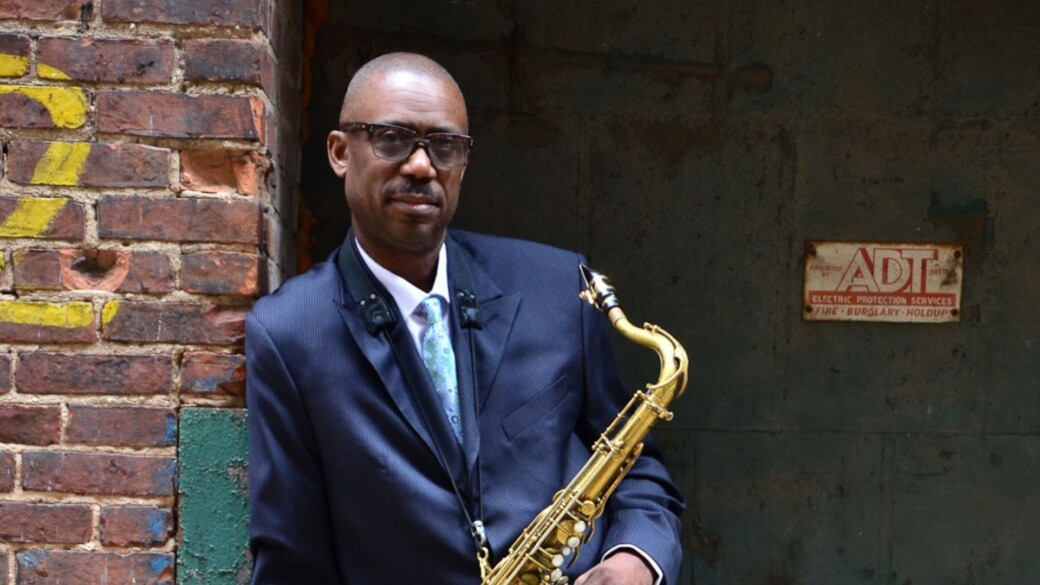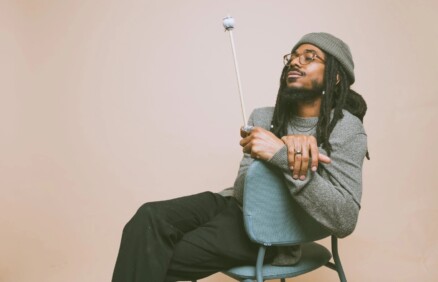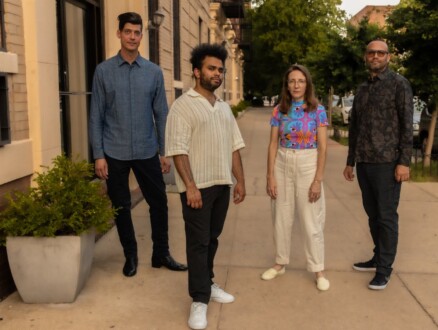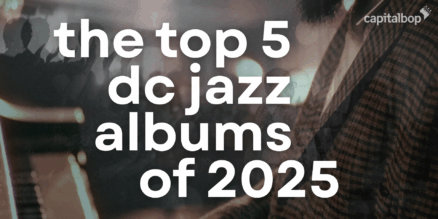‘Real jazz means the truth:’ Paul Carr on his new presenting series at Takoma Station

Those that follow Paul Carr on social media know — beyond his longstanding joke rivalry with fellow saxophonist Roger Woods — he ends most of his posts with “#realjazz2.” The term “real jazz” is one of the central pillars of Carr’s imprint on the D.C. jazz world. It is often how he brands the music he presents at the Mid-Atlantic Jazz Festival (MAJF) as well as the Betty Mae Kramer Gallery in Silver Spring. Now, he is bringing the moniker to Takoma Station every third Wednesday of the month as part of his “Real Jazz Wednesdays” series, continuing this Wednesday with the Vince Evans Trio.
The term originated from Carr’s original ethos for the music he wanted to feature at the MAJF: “acoustic jazz that is derived from swing and a danceable sensation when it’s played.” But the definition has expanded, as has the range of artists presented at the festival – from archetypes of the living tradition like Branford Marsalis to the contemporary sounds of Chelsey Green. “‘Real jazz,’ that term can also have some volatility to it,” Carr explained in a recent Zoom call from his home. “It can also be combative.”
Carr said that these days, when he says “real jazz” or uses the hashtag on social media, he wants it to mean “the truth. … Be true to what you’re playing.”
CapitalBop spoke to Carr about his approach to the new Takoma Station Wednesday series, informed by his fresh view of real jazz and his experience as a veteran jazz educator with the rapid post-pandemic changes in education and the rise of artificial intelligence.
This interview has been edited for length and clarity.
CapitalBop: How did this new Real Jazz Wednesdays series at Takoma Station come about?
Paul Carr: One of the owners, Mel, asked me if I would want to do a night at Takoma, to start doing some presenting. So, I thought about it and I said, “Yeah! Let’s throw something else on the fire,” because it’s not like I don’t have enough to do. But actually, it could be useful for several different things. I’m involved in a lot of different projects, [and there are] … things that I’m doing, and other people are doing, that are very valid that need to have more eyeballs.
CB: When you say projects you wanted more people’s eyeballs on, is that how you’ve been thinking about curating?
PC: Like the show we have coming up on the 16th of July — Vince Evans, great pianist, music director for a lot of great artists over the years. What he does is he does a Wednesday night workshop very similar to what Barry Harris used to do, and Barry Harris was actually one of his mentors. Vince used to go up to New York and take his workshops all the time. So, Vince started one here at his home. He has some of the best musicians and up and coming musicians that take his workshop on Wednesday night — singers, instrumentalists.
I had no idea he had that type of roster there. He was just doing it, the same way Barry Harris was just doing it, because of love of the music. It’s not like he was trying to get any notoriety out of it.
CB: You’ve branded this as Real Jazz Wednesdays. What do you want that term — “real jazz” — to mean?
PC: I just really want it to mean “the truth.” I thought about not using that term — trust me, I have thought about not using that. “Real jazz,” that term, can also have some volatility to it. Some people will be like, “I don’t want to hear that ‘real jazz,'” or whatever they perceive it to be.
Basically, when I say “real jazz means the truth,” [I mean] just be true to what you’re playing. Originally, when I started the Mid-Atlantic Jazz Festival, I was thinking about acoustic jazz and more traditional. … But as you can see, over the years we have evolved into including other types of music.
CB: And it’s like you were saying with Vince — organizing the workshop for the love of the music, not to make a buck.
PC: Right. It’s not trying to make a buck or get any kind of fame from it or notoriety. Barry Harris was doing it, and those videos resonate today from those workshops. I just saw one earlier today, a clip from it, and he’s spouting so much truth that it’s not even funny — truth about the music and life lessons, which as you know, go hand in hand.
CB: You have Real Jazz Wednesdays, the Second Wednesdays at the Betty Mae Kramer gallery in Silver Spring and the Mid-Atlantic Jazz Festival. Are you looking at any other presenting opportunities? How do you see all of this building on each other?
PC: Well, I think that’s enough because I really would like to — believe it or not — play a little bit more. That takes some leg work too. I could actually put myself in those venues more often than I do but, to me, that’s not really the focus of that. If I do Second Wednesday once a year at the Kramer, since I’m the curator, I think that’s enough. The same thing with the Third Wednesdays at Takoma.
All this stuff ties together: the teaching, the curating, the playing. One feeds the other. That’s what I found when I started the festival. Because I had the non-profit, it actually helped propel the festival truly out of just looking for somewhere for students to play and for students to play with professional musicians.
CB: Speaking of teaching, I’m curious about your Jazz Academy of Music. We seem to hear all the time about the crisis in education between phones in schools and students using artificial intelligence to do their work. I know these are not necessarily totally overlapping in your situation, but how do things feel to you? Have you had to change anything about the way you teach?
PC: Yeah, I definitely have because it has really still been recovering from the pandemic. I think kids’ attention spans are shorter. Another thing the pandemic did is, musicians were trying to make money online because we wasn’t working. So, you had all these guys popping up and giving lessons.
It reminds me of the “quick tip” golf lessons — a quick tip maybe lasts for three holes, then it falls apart. We had a lot of people that were doing these lessons online, giving these broad-stroke solutions of things that you could do. A lot of these kids, they think they can just, “Can I get a lesson today because I have an audition in two weeks?” That kind of thing.
They don’t realize this is an incremental thing that builds up for that. And with the phones, the attention span is shorter. …
Really, it gets down to the same old stuff where you have to develop your core skills: the reading and the rhythm and listening, with your ear. No app can really give you that. AI can’t give you that. So, it comes down to the bare bones to develop those organic skills.
Tickets for Real Jazz Wednesdays are available through paulcarrjazz.com/paul-carr-presents. Interested parties can also buy passes to multiple shows in three or five show groups.





